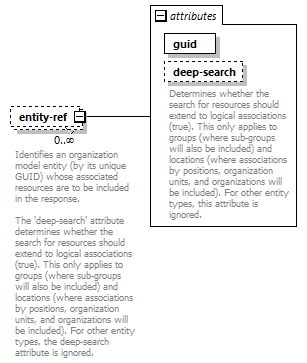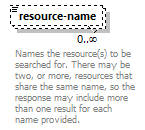| diagram |  |
||||||||||||||||||||||
| namespace | http://resource.api.de.bpm.tibco.com | ||||||||||||||||||||||
| properties |
|
||||||||||||||||||||||
| children | entity-ref resource-name | ||||||||||||||||||||||
| attributes |
|
||||||||||||||||||||||
| annotation |
|
||||||||||||||||||||||
| source | <xs:element name="findResources"> <xs:annotation> <xs:documentation>Request element for the findResource operation. The request identifies any number of groups, positions, organization units, organizations, locations, capabilities, or privileges from which the associated resources will be identified. The request may also identify resources by their name. Normally either GUIDs or resource names are specified in the request, however a mixture can be specified if necessary. Note that a request with no GUIDs or resource names is invalid - at least one of the two must be specified. Where both GUIDs and resource names are specified in the request these lists are independent of each of other - the GUIDs do not need to match up with corresponding resource names. The response lists those resources, giving their GUID, name, and label properties. If the same resource is associated with more than one of the entities identified in the request, that resource only appears once in the response. The response does not indicate the entity from which the resource was located. The model version in the request identifies the organization model major version in which the search for the entities should be performed. The default value of -1 indicates that the latest version should be used. When the request is to locate resources by their names, the model version is not used (but must still be valid). As a resource's associations, and the resource itself, can be limited by a date range, the search can selectively include only those resources that are currently associated with the identified entities. When searching by resource name or associations, a true value ensures that the response only includes those resources whose date restrictions fall within the current date/time. </xs:documentation> </xs:annotation> <xs:complexType> <xs:sequence> <xs:element name="entity-ref" minOccurs="0" maxOccurs="unbounded"> <xs:annotation> <xs:documentation>Identifies an organization model entity (by its unique GUID) whose associated resources are to be included in the response. The 'deep-search' attribute determines whether the search for resources should extend to logical associations (true). This only applies to groups (where sub-groups will also be included) and locations (where associations by positions, organization units, and organizations will be included). For other entity types, the deep-search attribute is ignored.</xs:documentation> </xs:annotation> <xs:complexType> <xs:attribute name="guid" type="xs:string" use="required"/> <xs:attribute name="deep-search" type="xs:boolean" use="optional" default="false"> <xs:annotation> <xs:documentation>Determines whether the search for resources should extend to logical associations (true). This only applies to groups (where sub-groups will also be included) and locations (where associations by positions, organization units, and organizations will be included). For other entity types, this attribute is ignored.</xs:documentation> </xs:annotation> </xs:attribute> </xs:complexType> </xs:element> <xs:element name="resource-name" type="xs:string" minOccurs="0" maxOccurs="unbounded"> <xs:annotation> <xs:documentation>Names the resource(s) to be searched for. There may be two, or more, resources that share the same name, so the response may include more than one result for each name provided.</xs:documentation> </xs:annotation> </xs:element> </xs:sequence> <xs:attribute name="model-version" type="xs:int" default="-1"> <xs:annotation> <xs:documentation>Identifies the major organization model version in which the identified entities are to be searched. The default value of -1 indicates that the latest version should be used. When searching for resources by name, this attribute is ignored.</xs:documentation> </xs:annotation> </xs:attribute> <xs:attribute name="current-only" type="xs:boolean" default="false"> <xs:annotation> <xs:documentation>Determines whether only resources currently associated with the identified entities are to be include (true). If false, any date ranges applied to the resource or its associations are ignored.</xs:documentation> </xs:annotation> </xs:attribute> </xs:complexType> </xs:element> |
attribute findResources/@model-version
| type | xs:int | ||
| properties |
|
||
| annotation |
|
||
| source | <xs:attribute name="model-version" type="xs:int" default="-1"> <xs:annotation> <xs:documentation>Identifies the major organization model version in which the identified entities are to be searched. The default value of -1 indicates that the latest version should be used. When searching for resources by name, this attribute is ignored.</xs:documentation> </xs:annotation> </xs:attribute> |
attribute findResources/@current-only
| type | xs:boolean | ||
| properties |
|
||
| annotation |
|
||
| source | <xs:attribute name="current-only" type="xs:boolean" default="false"> <xs:annotation> <xs:documentation>Determines whether only resources currently associated with the identified entities are to be include (true). If false, any date ranges applied to the resource or its associations are ignored.</xs:documentation> </xs:annotation> </xs:attribute> |
element findResources/entity-ref
| diagram |  |
||||||||||||||||||||
| properties |
|
||||||||||||||||||||
| attributes |
|
||||||||||||||||||||
| annotation |
|
||||||||||||||||||||
| source | <xs:element name="entity-ref" minOccurs="0" maxOccurs="unbounded"> <xs:annotation> <xs:documentation>Identifies an organization model entity (by its unique GUID) whose associated resources are to be included in the response. The 'deep-search' attribute determines whether the search for resources should extend to logical associations (true). This only applies to groups (where sub-groups will also be included) and locations (where associations by positions, organization units, and organizations will be included). For other entity types, the deep-search attribute is ignored.</xs:documentation> </xs:annotation> <xs:complexType> <xs:attribute name="guid" type="xs:string" use="required"/> <xs:attribute name="deep-search" type="xs:boolean" use="optional" default="false"> <xs:annotation> <xs:documentation>Determines whether the search for resources should extend to logical associations (true). This only applies to groups (where sub-groups will also be included) and locations (where associations by positions, organization units, and organizations will be included). For other entity types, this attribute is ignored.</xs:documentation> </xs:annotation> </xs:attribute> </xs:complexType> </xs:element> |
attribute findResources/entity-ref/@guid
| type | xs:string | ||
| properties |
|
||
| source | <xs:attribute name="guid" type="xs:string" use="required"/> |
attribute findResources/entity-ref/@deep-search
| type | xs:boolean | ||||
| properties |
|
||||
| annotation |
|
||||
| source | <xs:attribute name="deep-search" type="xs:boolean" use="optional" default="false"> <xs:annotation> <xs:documentation>Determines whether the search for resources should extend to logical associations (true). This only applies to groups (where sub-groups will also be included) and locations (where associations by positions, organization units, and organizations will be included). For other entity types, this attribute is ignored.</xs:documentation> </xs:annotation> </xs:attribute> |
element findResources/resource-name
| diagram |  |
||||||
| type | xs:string | ||||||
| properties |
|
||||||
| annotation |
|
||||||
| source | <xs:element name="resource-name" type="xs:string" minOccurs="0" maxOccurs="unbounded"> <xs:annotation> <xs:documentation>Names the resource(s) to be searched for. There may be two, or more, resources that share the same name, so the response may include more than one result for each name provided.</xs:documentation> </xs:annotation> </xs:element> |
XML Schema documentation generated by XMLSpy Schema Editor http://www.altova.com/xmlspy